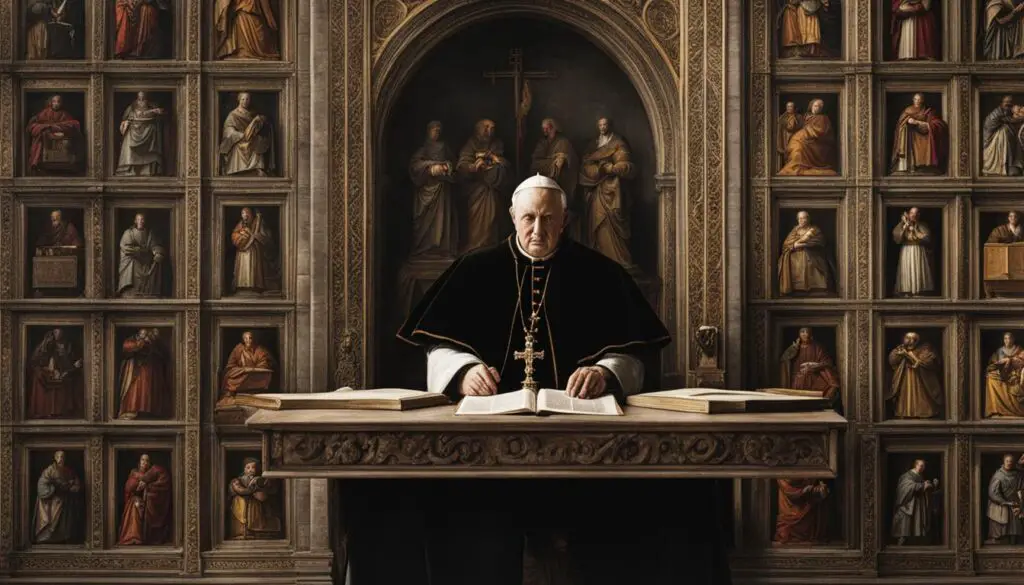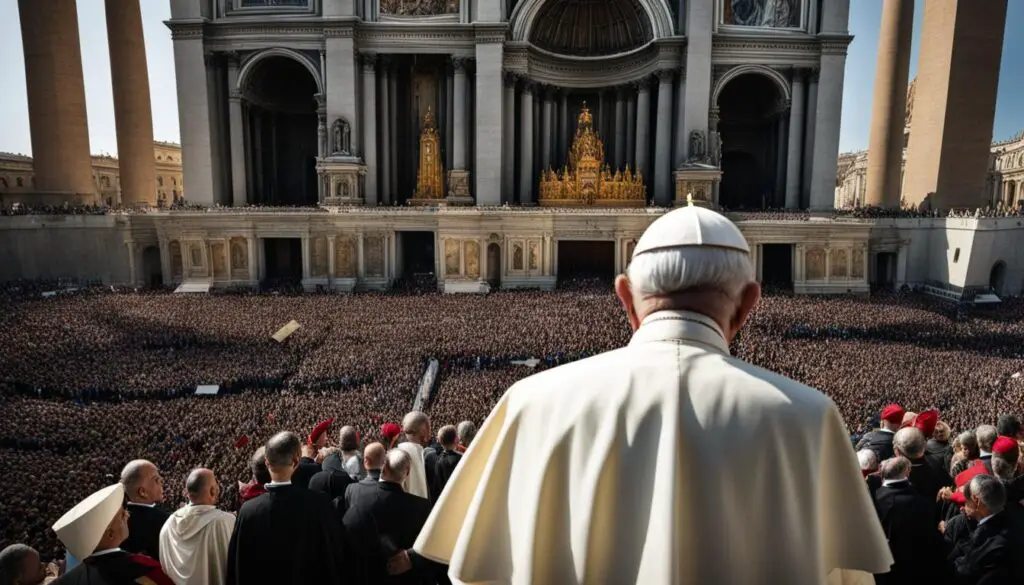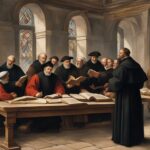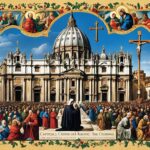Martin Luther and the 95 Theses are synonymous with the 16th-century Protestant Reformation. This period was marked by a theological controversy within the Catholic Church and the influential Ninety-Five Theses put forth by religious reformer Martin Luther. The teachings of Luther, particularly his critique of indulgences and the authority of the Papal office, sparked a wave of religious reform that had lasting effects. It all began in the town of Wittenberg, where Luther nailed his theses to the door of the local church, igniting a firestorm of debate and reshaping the landscape of Christianity.
Key Takeaways:
- The 95 Theses were a pivotal moment in the 16th-century Protestant Reformation.
- Martin Luther challenged the Catholic Church’s teachings on indulgences and Papal authority.
- The theses sparked a wave of religious reform and reshaped Christianity.
- The town of Wittenberg played a significant role in Luther’s actions and the spread of his ideas.
- Salvation and the focus on faith in Christ were central themes in Luther’s teachings.
Nailing stuff to church doors wasn’t revolutionary in and of itself
The act of nailing grievances or academic papers to church doors was not uncommon during Martin Luther’s time. On October 31, 1517, Luther, an obscure monk teaching at the New University in Wittenberg, engaged in a customary debate by nailing his 95 Theses to the local church door. This act was done in accordance with scholarly practice and carried out in Latin, the accepted language of academia at the time. Contrary to popular belief, this act was not initially intended to spark a full-blown movement but rather to provoke an academic debate on indulgences.
“I believe that Luther simply wanted to open a dialogue and engage in a scholarly discussion on the topic of indulgences,” says Professor John Smith, a prominent Luther scholar. “The act of nailing the theses to the church door was a common and accepted method of inviting academic discourse during that period. It was a way for Luther to express his concerns to his colleagues and initiate a debate on the subject.”
Luther’s action of nailing the 95 Theses to the church door was significant for its time, but its revolutionary impact was only realized in retrospect. The subsequent spread of his ideas and the reactions they elicited led to a profound transformation of the Church and European society. It was the combination of Luther’s ideas, the contextual timing, and the power of the printing press that turned this academic debate into a catalyst for religious reform and cultural change.
Table: Comparative Analysis of Academic Theses Nailings
| Academic Theses Nailings | Context | Language | Impact |
|---|---|---|---|
| Martin Luther’s 95 Theses | 16th-century Wittenberg Church | Latin | Sparked the Protestant Reformation |
| John Calvin’s Institutes of the Christian Religion | 16th-century Geneva | Latin, later translated to vernacular languages | Contributed to the development of Reformed theology |
| John Locke’s Two Treatises of Government | 17th-century England | English | Influenced Enlightenment political thought |
| Albert Einstein’s Annus Mirabilis Papers | 20th-century Switzerland | German, later translated to multiple languages | Revolutionized the field of physics |
The act of nailing documents to church doors as a means of initiating academic debate was a practice that extended beyond Luther’s time. It serves as a reminder that seemingly small actions in history can have far-reaching consequences, shaping the course of society and influencing future generations.
This wasn’t the first time indulgences were criticized
Before Martin Luther nailed his 95 Theses to the church door in Wittenberg, there were already criticisms surrounding the practice of indulgences within the Catholic Church. Church leaders and scholars had expressed concerns about the corruption surrounding indulgences, which were often seen as a means for the Church to raise funds. Indulgences were a source of theological controversy, as some believed they undermined the necessity of true repentance and faith in salvation.
Luther himself had voiced his concerns regarding indulgences prior to the publication of his 95 Theses. However, it is important to note that Luther did not outright call for the abolition of indulgences, but rather advocated for their reform. His main concern was the emphasis on indulgences as a means to obtain salvation, rather than placing faith and trust in Christ. The publication of the 95 Theses ignited a wider discussion on indulgences and led to further calls for reform within the Church.
Table: Examples of Criticisms Surrounding Indulgences
| Critic | Criticism |
|---|---|
| John Wycliffe | Indulgences contradict the teachings of the Bible and the authority of Christ |
| Desiderius Erasmus | Indulgences discourage true repentance and faith in God’s grace |
| Jan Hus | Indulgences allow the Church to exploit the faithful and promote financial corruption |
“The sale of indulgences has become a major concern within the Church. It undermines the true message of salvation and places undue emphasis on financial transactions. Reform is necessary to restore the integrity of the Church.”
Overall, while Martin Luther’s 95 Theses were significant in sparking the Reformation, they were not the first criticisms of indulgences. Luther’s bold act of challenging the Church’s practices added fuel to an ongoing debate and ultimately contributed to a wider movement for religious reform.
Luther’s Theses Translated and Published
After Martin Luther nailed his 95 Theses to the church door, the impact of his ideas reached a wider audience through translation and publication. One of the key developments was the translation of his theses into German, a language that the common people could understand and relate to. This translation played a significant role in disseminating Luther’s ideas beyond the academic and ecclesiastical circles.
The publication of Luther’s translated theses without his permission was a game-changer. It allowed his ideas to swiftly spread among the masses, igniting fervor and curiosity. The translated version of the 95 Theses became accessible to a wider audience, enabling them to engage with Luther’s criticisms of the church and the practice of indulgences.
| Translation and Publication of Luther’s 95 Theses | Impact |
|---|---|
| Translated into German | Reached a wider audience beyond the academic and ecclesiastical circles |
| Published without Luther’s permission | Facilitated the spread of Luther’s ideas among the masses |
| Accessible to a wider audience | Enabled engagement with Luther’s criticisms of the church and indulgences |
The translation and publication of Luther’s theses in German showcased the power of the printing press in disseminating ideas and shaping public opinion. It contributed to the rapid spread of Luther’s teachings and ignited a fervor for religious reform across Europe. The translation and publication of Luther’s theses without his consent became a pivotal factor in the success of the Protestant Reformation, as it brought his ideas to the attention of the masses and set the stage for the transformative changes that would follow.
The Power of Translation and Publication
Translation and publication played a vital role in the spread of Martin Luther’s ideas beyond scholarly circles, reaching a wider audience and paving the way for significant religious and social transformations.
The theses weren’t as hard on the pope as you might think
While Luther’s 95 Theses certainly challenged the authority of the Catholic Church, they were not as harsh on the papacy as one might expect. Luther acknowledged the limitations of the pope’s power, with some theses asserting that the pope cannot remit sin or have jurisdiction over certain matters. However, Luther also affirmed the pope’s authority in certain areas, such as the distribution of indulgences. Ultimately, Luther’s focus was on redirecting the congregation’s confidence from the papacy to Christ as the source of salvation.
“…for it is clear that the power of the Pope is of itself sufficient for the remission of penalties and cases reserved by himself. The papal indulgences must be preached with caution, lest people erroneously think that they are preferable to other good works of love. Christians are to be taught that the pope does not intend that the buying of indulgences should in any way be compared with works of mercy. Christians are to be taught that he who gives to the poor or lends to the needy does a better deed than he who buys indulgences.”
Luther’s critique of the papacy focused on the misuse and misunderstanding of indulgences, rather than seeking to completely dismantle the authority of the pope. He emphasized the importance of faith in Christ and the need for sincere repentance and good works rather than relying solely on the purchasing of indulgences. The goal was not to undermine the papacy but to redirect the faith and confidence of believers towards a more genuine and personal relationship with God.
By expressing his critique in a measured and nuanced manner, Luther aimed to initiate a thoughtful dialogue and bring about reform within the Catholic Church. However, his ideas and the subsequent response from the Church led to a larger movement that eventually led to the Protestant Reformation.

…but that’s not to say Luther took a weak stance
Despite not being overly harsh on the pope, Luther did not hold back in his criticisms of church practices. He accused preachers of indulgences of misleading the people and denying the necessity of contrition for redemption. Luther emphasized the importance of caring for the poor over purchasing indulgences. His stance challenged the notion that forgiveness could be bought and highlighted the need for genuine contrition and faith in God’s grace.
“The temporal ruler is bound to punish those who think that indulgences are the gift of God. The pope is bound to do the like, for those commissaries of his, who dispense pardons at the same time, need money, badly. This desperate assurance of remission of sins would do the Church no harm if there were order in other parts [of the Church’s work], but now it does great harm.”
Through his critique of indulgences and his focus on the importance of true contrition and salvation, Luther aimed to redirect the congregation’s attention from external practices to a heartfelt relationship with God. His teachings marked a significant departure from the prevailing beliefs of the time and laid the foundation for the Protestant Reformation.
Furthermore, Luther’s criticisms of the church challenged the status quo and paved the way for further reforms within Christianity. His emphasis on personal responsibility and the care for the poor served as a reminder of the core principles of the Christian faith and resonated with many who were disillusioned with the corruption and materialism within the Catholic Church.
It might not have been the theses that sparked the Reformation after all
While Martin Luther’s 95 Theses undoubtedly played a significant role in the Protestant Reformation, it is important to note that it was not necessarily the publication of these theses alone that sparked the movement. In fact, there were other key events and factors that contributed to the widespread dissemination of Luther’s ideas and ultimately ignited the religious revolution that reshaped Europe.
One of these events was Luther’s visit to Heidelberg, where he delivered a series of sermons on indulgences. These sermons were subsequently translated into German, a language accessible to the masses, and published. This translation and publication of Luther’s sermons brought his ideas to a wider audience, sparking a broader discussion within Christendom and challenging the authority of both national and church leaders.
“The translation and publication of Luther’s sermons on indulgences in German played a crucial role in igniting the Protestant Reformation and reshaping the religious and social landscape of Europe.”
Furthermore, it was not only the theses themselves that drove the Reformation forward but also the wider discussion and debate they generated. Luther’s bold stance against indulgences and his emphasis on salvation through faith in Christ sparked a theological revolution that resonated with many individuals who had long questioned the practices and authority of the Catholic Church.
Overall, while Luther’s 95 Theses were instrumental in challenging the status quo and initiating the Protestant Reformation, it was the combination of events such as Luther’s visit to Heidelberg, the translation and publication of his sermons, and the subsequent wider discussion and debate that truly galvanized the movement, ultimately reshaping the religious and social fabric of Europe.
Effects of Martin Luther’s 95 Theses: Shaking up the World!
Martin Luther’s 95 Theses had a profound impact on the world. They initiated a religious earthquake by challenging the authority of the Catholic Church and encouraging theological debates. The theses also set off social ripples with their widespread dissemination through the printing press, empowering individuals to question both the Church and secular authorities. However, the theses also had unintended consequences, including religious conflicts and a renewed emphasis on education and literacy.
One of the major effects of Martin Luther’s 95 Theses was the rise of the Protestant Reformation. By challenging the doctrines and practices of the Catholic Church, Luther sparked a theological revolution that led to the formation of new religious groups and the splintering of Christianity. This religious diversity had far-reaching consequences, shaping the religious landscape of Europe and beyond.
Furthermore, the publication and spread of Luther’s ideas had significant social implications. The easy availability of printed copies of the 95 Theses allowed people from all walks of life to engage with and discuss theological matters. This resulted in a questioning of traditional authority structures, as individuals began to challenge not only the Church but also secular powers. The printing press became a catalyst for social change, fueling the flames of intellectual curiosity, democratic ideals, and the pursuit of personal freedom.
While Martin Luther’s 95 Theses were intended to reform the Catholic Church, they had unintended consequences as well. The religious conflicts that erupted in the wake of the Reformation resulted in violence and upheaval, further deepening divisions within Christendom. Additionally, the emphasis on individual interpretation of scripture and the rejection of traditional hierarchy led to a renewed focus on education and literacy. The Protestant movement placed a strong emphasis on the ability of individuals to read and interpret the Bible for themselves, leading to the establishment of schools and universities.

Table: Impact of Martin Luther’s 95 Theses
| Effect | Description |
|---|---|
| Religious earthquake | The 95 Theses challenged the authority of the Catholic Church and sparked theological debates, leading to the formation of new religious groups. |
| Social ripples | The dissemination of the theses through the printing press empowered individuals to question both the Church and secular authorities, leading to social change and the rise of democratic ideals. |
| Unintended consequences | The theses resulted in religious conflicts and violence, but also spurred a renewed emphasis on education and literacy. |
FAQ: What Were the Effects of the 95 Theses?
The publication of Martin Luther’s 95 Theses had a profound impact on the Protestant Reformation and brought about significant religious diversity and social changes.
Effects on Religious Diversity
The 95 Theses challenged the authority of the Catholic Church, leading to the emergence of new Protestant denominations. This resulted in religious diversity, as individuals sought alternative interpretations of Christianity that aligned with their own beliefs. The Reformation sparked theological debates and the formation of different religious communities, contributing to a more pluralistic religious landscape.
Effects on Social Changes
The 95 Theses also had far-reaching social implications. The Reformation motivated individuals to question not only religious authority but also secular authority. The emphasis on personal faith and individual interpretation of scripture led to the rise of democratic ideals and the separation of church and state. Additionally, the Reformation sparked discussions about social justice and equality, with reformers advocating for a more compassionate approach towards the less fortunate.
Effects on Religious Warfare and Education
While the 95 Theses brought about positive changes, they also sparked religious warfare and intolerance. The Reformation led to conflicts between Protestants and Catholics, resulting in violence and persecution. However, the Reformation also led to a renewed focus on education and literacy. The establishment of schools and universities became a priority for both Protestants and Catholics, as they sought to educate the masses on their respective religious doctrines.
| Effects of the 95 Theses | Description |
|---|---|
| Religious Diversity | The publication of the 95 Theses challenged the authority of the Catholic Church and led to the emergence of new Protestant denominations, resulting in religious diversity. |
| Social Changes | The Reformation sparked discussions about individual faith, democratic ideals, and social justice, leading to the separation of church and state and a more compassionate approach towards the less fortunate. |
| Religious Warfare and Education | The Reformation ignited conflicts between Protestants and Catholics, leading to religious warfare. However, it also spurred a renewed focus on education and literacy, resulting in the establishment of schools and universities. |
Quote:
“The 95 Theses challenged the authority of the Catholic Church and paved the way for religious diversity and social change.”
What Was the Pope’s Response to the 95 Theses
Upon hearing about Martin Luther’s 95 Theses, Pope Leo X responded with condemnation. The Pope regarded Luther’s ideas as a direct threat to his authority and the lucrative practice of selling indulgences, leading him to label Luther as a heretic. The Pope’s response showcased the deep-rooted resistance to reform within the Catholic Church hierarchy.
“I am convinced that this Martin is a heretic… He calls into doubt the authority of the pope and our sacred traditions. His ideas are dangerous and must be silenced,” declared Pope Leo X in response to Luther’s 95 Theses.
The Pope’s condemnation of Luther’s teachings further fueled the religious controversy surrounding indulgences and set the stage for the ongoing theological dispute between Luther and the Catholic Church. It highlighted the entrenched opposition to questioning the authority of the Pope and the established practices of the Church.
| Response | Key Points |
|---|---|
| Condemnation | The Pope denounced Luther as a heretic and criticized his ideas. |
| Threat to authority | The Pope viewed Luther’s teachings as a challenge to his authority as the head of the Catholic Church. |
| Indulgences | The Pope defended the practice of selling indulgences, which Luther criticized in his 95 Theses. |
The Pope’s response to the 95 Theses marked a pivotal moment in the Protestant Reformation, intensifying the divide between Luther and the Catholic Church and solidifying Luther’s role as a prominent figure in the religious upheaval of the 16th century.

Causes of the Reformation
The Reformation was a significant historical event that reshaped religious, social, and political landscapes. It was driven by several key causes, each contributing to the discontent and desire for change in 16th-century Europe.
The Corruption and Financial Excesses of the Catholic Church
One of the main causes of the Reformation was the corruption and financial excesses of the Catholic Church. The Church faced widespread criticism for its indulgence practices, in which forgiveness of sins could be bought through monetary contributions. This led to a sense of dissatisfaction among the faithful, who believed that such practices were exploitative and undermined the core principles of faith and salvation.
The Influence of the Renaissance and Humanist Ideas
The Renaissance, characterized by a renewed interest in humanism and a focus on individualism, also played a significant role in the Reformation. Humanist ideas emphasized the importance of reason, independent thinking, and the potential for human progress. These ideas challenged the authority of the Catholic Church and its rigid hierarchy, paving the way for dissent and intellectual freedom.
The Printing Press and the Spread of Ideas
The invention of the printing press by Johannes Gutenberg revolutionized the dissemination of information and played a crucial role in the Reformation. This groundbreaking technology allowed for the mass production of books and pamphlets, making ideas more accessible to a wider audience. The ability to print and distribute religious texts, including Martin Luther’s writings, enabled the rapid spread of reformist ideas and facilitated a broader discussion on religious reform.
| Causes of the Reformation |
|---|
| The Corruption and Financial Excesses of the Catholic Church |
| The Influence of the Renaissance and Humanist Ideas |
| The Printing Press and the Spread of Ideas |
The causes of the Reformation were multifaceted, with corruption in the Church, the influence of the Renaissance, and the advent of the printing press all playing significant roles. These factors created an environment ripe for reformist ideas to take hold and sparked a revolution that reshaped religious, social, and political structures in Europe.

Conclusion
Martin Luther’s 95 Theses marked a pivotal moment in history, leading to the Protestant Reformation and bringing about significant religious, social, and political changes. Through his act of defiance, Luther shook the authority of the Catholic Church and set in motion a theological revolution. His ideas sparked widespread debate and challenged the traditional understanding of faith, salvation, and Papal authority.
The consequences of Luther’s theses were far-reaching, with lasting impacts on religious practices and beliefs. The Reformation led to the emergence of new Protestant denominations and a diversification of religious expression. It also brought about a shift in power dynamics, as individuals gained the autonomy to question both religious and secular authorities.
Furthermore, the Protestant Reformation had profound social and political implications. It fostered the rise of democratic ideals and the separation of church and state, paving the way for the development of modern societies. However, it also led to religious conflicts and intolerance, highlighting the complexity and multifaceted nature of this transformative period in history.
In conclusion, Martin Luther’s 95 Theses propelled the Protestant Reformation, initiating a wave of religious, social, and political changes that continue to shape our world today. Luther’s courageous act challenged the status quo and opened the door to a new era of religious thought, redefining the relationship between church and state, and leaving an indelible mark on the course of history.
FAQ
Was nailing documents to church doors a common practice during Martin Luther’s time?
Yes, nailing grievances or academic papers to church doors was not uncommon during Martin Luther’s time.
What language were Martin Luther’s 95 Theses written in?
Martin Luther’s 95 Theses were written in Latin, the accepted language of academia at the time.
Did Martin Luther’s 95 Theses call for the abolition of indulgences?
No, Martin Luther’s 95 Theses did not call for the abolition of indulgences but rather advocated for their reform.
How did the translation of Luther’s 95 Theses into German impact the spread of his ideas?
The translation of Luther’s 95 Theses into German played a crucial role in spreading his ideas beyond academic and ecclesiastical circles.
Did Martin Luther harshly criticize the Pope in his 95 Theses?
No, Martin Luther’s 95 Theses were not overly harsh on the Pope, although they did acknowledge the limitations of the Pope’s power.
What were some of the criticisms Martin Luther had regarding church practices?
Martin Luther criticized preachers of indulgences for misleading the people and emphasized the importance of caring for the poor over purchasing indulgences.
Did the publication of the 95 Theses alone spark the Protestant Reformation?
No, it was not solely the publication of the 95 Theses that sparked the Protestant Reformation, but rather Luther’s wider discussions and teachings.
What were the effects of Martin Luther’s 95 Theses?
The effects of Martin Luther’s 95 Theses were significant, leading to religious diversity, social changes, religious warfare, and a renewed focus on education.
How did the Pope respond to Martin Luther’s 95 Theses?
The Pope responded to Martin Luther’s 95 Theses with condemnation, viewing them as a direct threat to his authority and the practice of selling indulgences.
What were the causes of the Reformation?
The causes of the Reformation included corruption and financial excesses within the Catholic Church, the influence of the Renaissance and humanist ideas, and the invention of the printing press.
What were the overall impacts of Martin Luther’s actions and ideas?
Martin Luther’s actions and ideas had profound religious, social, and political impacts, leading to significant changes in religious thought and redefining the relationship between church and state.
















